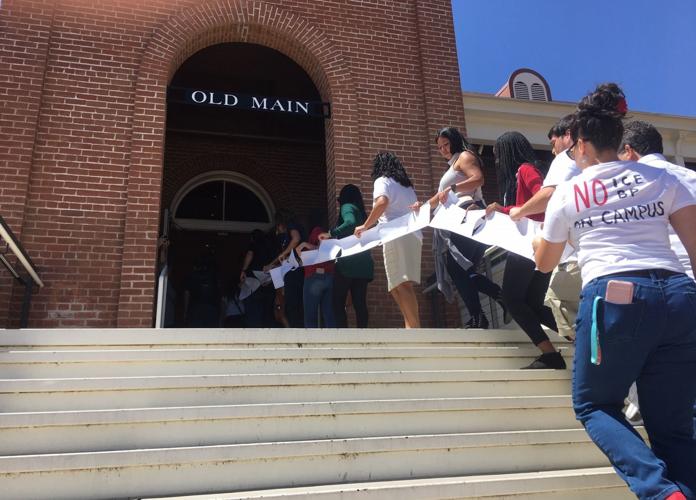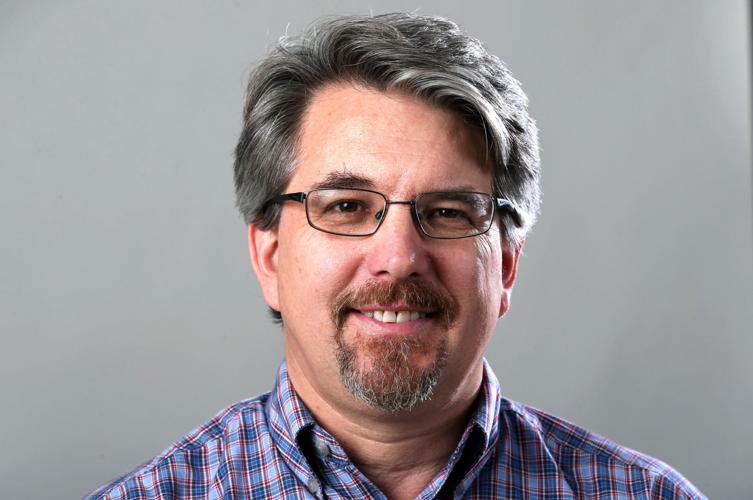University of Arizona Provost Jeff Goldberg will have you know that he grew up in an inner-city Pittsburgh neighborhood and went to integrated schools, which taught him a lot.
And that he read UA professor Nolan Cabrera’s book “White Guys on Campus” and thought it was the best book he’s read this year.
And that he learned a lot from the campus activists who interrupted him and other speakers with repeated chants during a “campus conversation” Tuesday morning. He felt their pain.
This was the tenor of much of the first forum following the campus maelstrom that ensued after three students disrupted a presentation by Border Patrol agents on campus March 19.
The administration and faculty on a panel were so eager to demonstrate that they, too, are sensitive to marginalized people that they were willing to take just about any abuse from the campus activists who sat in the first few rows.
“I especially want to thank the group up in front here,” Goldberg said at the end. “We are learning every single day, even at (age) 61.”
This group had interrupted him twice earlier in the event, once with a call-and-response that went, “Uniforms and guns are not protected speech. How can we be civil with a gun in our face?”
Some activists also called on their putative allies on the panel to reject it altogether and leave the stage. They didn’t: Cabrera and Mexican American Studies department head Anna Ochoa O’Leary chose to stay in the thick, stuffed chairs set out onstage for the six panelists and moderator Nancy Montoya of Arizona Public Media. About 200 people attended the event, which was set up for at least double that amount.
UA President Robert Robbins introduced the event, but then, puzzlingly, left the stage to the panel and was loathe to answer any of the many questions addressed to him. Goldberg was the sacrificial administrator left onstage.
As annoying as I found some of the posturing and self-righteousness offered by the hardcore activists, I had to agree with them about one thing: The forum was largely an effort at co-optation and deconfliction, not really addressing the fundamental remaining issues.
In fact, the key remaining difference of opinion is unlikely ever to be resolved in favor of the activists, who want uniformed immigration agents banned from campus.
However, a key part of the initial conflict had been resolved before the campus conversation started, thanks to the Pima County Attorney’s Office. Prosecutors there decided Friday to drop the misdemeanor charges against three students who disrupted the career-day presentation by two Border Patrol agents, calling them “murder patrol,” and cursing at them in Spanish when they finally returned to their vehicle. Some people were still wearing shirts that said “Drop the Charges,” but that wish had already been granted.
So the focus was more on the remaining, core dispute, and it will be much easier for administrators to feel the activists’ pain than to agree to their demands.
The coalition that formed after the incident is pressing the idea that Border Patrol and Immigration and Customs Enforcement agents should be banned from campus because they represent a form of institutional violence and impose stress on the lives of students, especially undocumented or DACA students. This is intolerable, especially at a university that recently received the formal designation of a Hispanic Serving Institution, some argued.
I don’t doubt that seeing Border Patrol agents on campus could cause undocumented students serious stress.
But there are many other factors at play in the upcoming decision. The legality of a ban is questionable, as are the politics and, ultimately, the wisdom. I mention the wisdom of the idea, because it would be easy for administrators (and columnists) to hold onto the crutch of illegality — to say that maybe it would be good to ban agents from campus, but it would be illegal.
But I argue it also remains unwise from a broader perspective. Border Patrol agents are working at the heart of one of the most contentious issues of our times. Their perspectives are valuable and worthwhile for students to hear, along with other perspectives on border and immigration issues — as long as they are on campus as invited guests. If they came on campus to, for example, attempt to arrest DACA students, that would be different: Massive resistance would be justified.
Leaving that aside, university administrators must also consider the politics of their situation. The Republican-majority Legislature slashed funding for the universities for years after the recession, and they’re unlikely to treat the University of Arizona more favorably if the UA administration gives in to activist demands to try to ban agents from campus.
Four legislators put out a statement Tuesday decrying the decision by the Pima County Attorney’s Office to drop the criminal charges, but emphasized what they expect of Robbins. Rep. Mark Finchem, an Oro Valley Republican frequently critical of the universities, wrote: “We have also been told that professors openly challenge President Robbins’ authority as the top administrator, and while he advocates for greater funding, he is undermined by unethical behaviors in his organization. Shame on the Faculty Senate and the closed-minded professors who encourage interference with the operations of the school, so that their personal ideological agenda can be advanced.”
I’ve never been a fan of Finchem, but he represents a faction of the governing party. They must at least be considered as the UA administration decides how to act.
When he wasn’t speaking fawningly of the people interrupting him, Goldberg actually gave a pretty solid hint as to where this will end up.
“The way to keep people safe is through preparation, knowing who is on this campus and what are they doing here,” he said. “One of the plans we’re going to do is to put a system together that when groups do invite speakers on to campus, they’re going to have to tell us who the speakers are.”
This is not a feel-your-pain declaration. It’s boring and practical. But a warning system for when agents or other triggering speakers are on campus is about as good as it’s going to get, no matter how many campus conversations are held.





